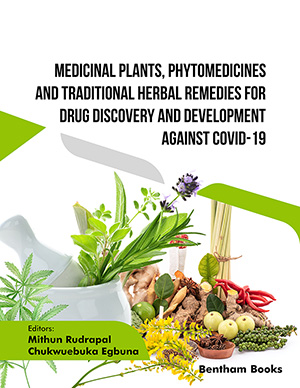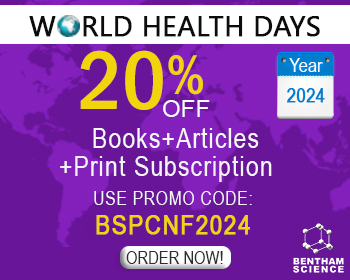[1]
Randall C, Vizuete J, Wendorf G, Ayyar B, Constantine G. Current and emerging strategies in the management of Crohn’s disease. Best Pract Res Clin Gastroenterol 2012; 26(5): 601-10.
[2]
Hazlewood GS, Rezaie A, Borman M, et al. Comparative effectiveness of immunosuppressants and biologics for inducing and maintaining remission in Crohn’s disease: a network meta-analysis. Gastroenterology 2015; 148(2): 344-54.
[3]
Cholapranee A, Hazlewood GS, Kaplan GG, Peyrin-Biroulet L, Ananthakrishnan AN. Systematic review with meta-analysis: comparative efficacy of biologics for induction and maintenance of mucosal healing in Crohn’s disease and ulcerative colitis controlled trials. Aliment Pharmacol Ther 2017; 45(10): 1291-302.
[4]
Mao EJ, Hazlewood GS, Kaplan GG, Peyrin-Biroulet L, Ananthakrishnan AN. Systematic review with meta-analysis: comparative efficacy of immunosuppressants and biologics for reducing hospitalisation and surgery in Crohn’s disease and ulcerative colitis. Aliment Pharmacol Ther 2017; 45: 3-13.
[5]
Olivera P, Spinelli A, Gower-Rousseau C, Danese S, Peyrin-Biroulet L. Surgical rates in the era of biological therapy: up, down or unchanged? Curr Opin Gastroenterol 2017; 33(4): 246-53.
[6]
Roda G, Jharap B, Neeraj N, Colombel JF. Loss of response to anti-TNFs: Definition, epidemiology, and management. Clin Transl Gastroenterol 2016; 7: e135.
[7]
Chaparro M, Guerra I, Muñoz-Linares P, Gisbert JP. Systematic review: antibodies and anti-TNF-α levels in inflammatory bowel disease. Aliment Pharmacol Ther 2012; 35(9): 971-86.
[8]
de Buck van Overstraeten A, Wolthuis A, D’Hoore A. Surgery for Crohn’s disease in the era of biologicals: a reduced need or delayed verdict? World J Gastroenterol 2012; 18(29): 3828-32.
[9]
Grimstad Ø, Sandanger Ø, Ryan L, et al. Cellular sources and inducers of cytokines present in acute wound fluid. Wound Repair Regen 2011; 19(3): 337-47.
[10]
Reinke JM, Sorg H. Wound repair and regeneration. Eur Surg Res 2012; 49(1): 35-43.
[11]
Rapala K. The effect of tumor necrosis factor-alpha on wound healing. An experimental study. Ann Chir Gynaecol Suppl 1996; 211: 1-53.
[12]
Mast BA, Schultz GS. Interactions of cytokines, growth factors, and proteases in acute and chronic wounds. Wound Repair Regen 1996; 4(4): 411-20.
[13]
Maish GO 3rd, Shumate ML, Ehrlich HP, Cooney RN. Tumor necrosis factor binding protein improves incisional wound healing in sepsis. J Surg Res 1998; 78(2): 108-14.
[14]
Lee RH, Efron DT, Tantry U, et al. Inhibition of tumor necrosis factor-alpha attenuates wound breaking strength in rats. Wound Repair Regen 2000; 8(6): 547-53.
[15]
Frostberg E, Ström P, Gerke O, Qvist N. Infliximab’s influence on anastomotic strength and degree of inflammation in intestinal surgery in a rabbit model. BMC Surg 2014; 14: 23.
[16]
Papaconstantinou I, Zeglinas C, Gazouli M, et al. Effect of infliximab on the healing of intestinal anastomosis. An experimental study in rats. Int J Surg 2014; 12(9): 969-75.
[17]
Karaköse O, Eken H, Ulusoy AN, et al. The Effect of infliximab on intestinal anastomosis healing in rats. Prague Med Rep 2016; 117(2-3): 108-16.
[18]
Colombel JF, Loftus EV Jr, Tremaine WJ, et al. Early postoperative complications are not increased in patients with Crohn’s disease treated perioperatively with infliximab or immunosuppressive therapy. Am J Gastroenterol 2004; 99(5): 878-83.
[19]
Marchal L, D’Haens G, Van Assche G, et al. The risk of post-operative complications associated with infliximab therapy for Crohn’s disease: a controlled cohort study. Aliment Pharmacol Ther 2004; 19(7): 749-54.
[20]
Appau KA, Fazio VW, Shen B, et al. Use of infliximab within 3 months of ileocolonic resection is associated with adverse postoperative outcomes in Crohn’s patients. J Gastrointest Surg 2008; 12(10): 1738-44.
[21]
Kunitake H, Hodin R, Shellito PC, et al. Perioperative treatment with infliximab in patients with Crohn’s disease and ulcerative colitis is not associated with an increased rate of postoperative complications. J Gastrointest Surg 2008; 12(10): 1730-6.
[22]
Nasir BS, Dozois EJ, Cima RR, et al. Perioperative anti-tumor necrosis factor therapy does not increase the rate of early postoperative complications in Crohn’s disease. J Gastrointest Surg 2010; 14(12): 1859-65.
[23]
Canedo J, Lee SH, Pinto R, et al. Surgical resection in Crohn’s disease: is immunosuppressive medication associated with higher postoperative infection rates? Colorectal Dis 2011; 13(11): 1294-8.
[24]
Rizzo G, Armuzzi A, Pugliese D, et al. Anti-TNF-alpha therapies do not increase early postoperative complications in patients with inflammatory bowel disease. An Italian single-center experience. Int J Colorectal Dis 2011; 26(11): 1435-44.
[25]
Mascarenhas C, Nunoo R, Asgeirsson T, et al. Outcomes of ileocolic resection and right hemicolectomies for Crohn’s patients in comparison with non-Crohn’s patients and the impact of perioperative immunosuppressive therapy with biologics and steroidson inpatient complications. Am J Surg 2012; 203(3): 375-8.
[26]
El-Hussuna A, Andersen J, Bisgaard T, et al. Biologic treatment or immunomodulation is not associated with postoperative anastomotic complications in abdominal surgery for Crohn’s disease. Scand J Gastroenterol 2012; 47(6): 662-8.
[27]
Kasparek MS, Bruckmeier A, Beigel F, et al. Infliximab does not affect postoperative complication rates in Crohn’s patients undergoing abdominal surgery. Inflamm Bowel Dis 2012; 18(7): 1207-13.
[28]
Nørgård BM, Nielsen J, Qvist N, et al. Pre-operative use of anti-TNF-α agents and the risk of post-operative complications in patients with Crohn’s disease--a nationwide cohort study. Aliment Pharmacol Ther 2013; 37(2): 214-24.
[29]
Waterman M, Xu W, Dinani A, et al. Preoperative biological therapy and short-term outcomes of abdominal surgery in patients with inflammatory bowel disease. Gut 2013; 62(3): 387-94.
[30]
Krane MK, Allaix ME, Zoccali M, et al. Preoperative infliximab therapy does not increase morbidity and mortality after laparoscopic resection for inflammatory bowel disease. Dis Colon Rectum 2013; 56(4): 449-57.
[31]
Syed A, Cross RK, Flasar MH. Anti-tumor necrosis factor therapy is associated with infections after abdominal surgery in Crohn’s disease patients. Am J Gastroenterol 2013; 108(4): 583-93.
[32]
Myrelid P, Marti-Gallostra M, Ashraf S, et al. Complications in surgery for Crohn’s disease after preoperative antitumour necrosis factor therapy. Br J Surg 2014; 101(5): 539-45.
[33]
Yamamoto T, Spinelli A, Suzuki Y, et al. Risk factors for complications after ileocolonic resection for Crohn’s disease with a major focus on the impact of preoperative immunosuppressive and biologic therapy: a retrospective international multicentre study. United European Gastroenterol J 2016; 4(6): 784-93.
[34]
Kotze PG, Saab MP, Saab B, et al. Tumor necrosis factor alpha inhibitors did not influence postoperative morbidity after elective surgical resections in Crohn’s disease. Dig Dis Sci 2017; 62(2): 456-64.
[35]
Fumery M, Seksik P, Auzolle C, et al. REMIND study group investigators. Postoperative complications after ileocecal resection in Crohn’s disease: a prospective study from the REMIND group. Am J Gastroenterol 2017; 112(2): 337-45.
[36]
Brouquet A, Maggiori L, Zerbib P, et al. GETAID chirurgie group. Anti-TNF therapy is associated with an increased risk of postoperative morbidity after surgery for ileocolonic Crohn disease: results of a prospective nationwide cohort. Ann Surg 2018; 267(2): 221-8.
[37]
Ehteshami-Afshar S, Nikfar S, Rezaie A, Abdollahi M. A systematic review and meta-analysis of the effects of infliximab on the rate of colectomy and post-operative complications in patients with inflammatory bowel disease. Arch Med Sci 2011; 7(6): 1000-12.
[38]
Kopylov U, Ben-Horin S, Zmora O, Eliakim R, Katz LH. Anti-tumor necrosis factor and postoperative complications in Crohn’s disease: systematic review and meta-analysis. Inflamm Bowel Dis 2012; 18(12): 2404-13.
[39]
Billioud V, Ford AC, Tedesco ED, et al. Preoperative use of anti-TNF therapy and postoperative complications in inflammatory bowel diseases: a meta-analysis. J Crohn’s Colitis 2013; 7(11): 853-67.
[40]
Rosenfeld G, Qian H, Bressler B. The risks of post-operative complications following pre-operative infliximab therapy for Crohn’s disease in patients undergoing abdominal surgery: a systematic review and meta-analysis. J Crohn’s Colitis 2013; 7(11): 868-77.
[41]
Narula N, Charleton D, Marshall JK. Meta-analysis: peri-operative anti-TNFα treatment and post-operative complications in patients with inflammatory bowel disease. Aliment Pharmacol Ther 2013; 37(11): 1057-64.
[42]
El-Hussuna A, Krag A, Olaison G, Bendtsen F, Gluud LL. The effect of anti-tumor necrosis factor alpha agents on postoperative anastomotic complications in Crohn’s disease: a systematic review. Dis Colon Rectum 2013; 56(12): 1423-33.
[43]
Yang ZP, Hong L, Wu Q, Wu KC, Fan DM. Preoperative infliximab use and postoperative complications in Crohn’s disease: a systematic review and meta-analysis. Int J Surg 2014; 12(3): 224-30.
[44]
Waterland P, Athanasiou T, Patel H. Post-operative abdominal complications in Crohn’s disease in the biological era: Systematic review and meta-analysis. World J Gastrointest Surg 2016; 8(3): 274-83.
[45]
Yamamoto T, Watanabe T. Surgery for luminal Crohn’s disease. World J Gastroenterol 2014; 20(1): 78-90.
[46]
Strong S, Steele SR, Boutrous M, et al. Clinical practice guidelines committee of the american society of colon and rectal surgeons. clinical practice guideline for the surgical management of crohn’s disease. Dis Colon Rectum 2015; 58(11): 1021-36.
[47]
Bemelman WA, Warusavitarne J, Sampietro GM, et al. ECCO-ESCP consensus on surgery for Crohn’s disease. J Crohn’s Colitis 2018; 12(1): 1-16.
[48]
Farmer RG, Hawk WA, Turnbull RB Jr. Indications for surgery in Crohn’s disease: analysis of 500 cases. Gastroenterology 1976; 71(2): 245-50.
[49]
Post S, Betzler M, von Ditfurth B, et al. Risks of intestinal anastomoses in Crohn’s disease. Ann Surg 1991; 213(1): 37-42.
[50]
Yamamoto T, Allan RN, Keighley MR. Risk factors for intra-abdominal sepsis after surgery in Crohn’s disease. Dis Colon Rectum 2000; 43(8): 1141-5.
[51]
Alves A, Panis Y, Bouhnik Y, et al. Risk factors for intra-abdominal septic complications after a first ileocecal resection for Crohn’s disease: a multivariate analysis in 161 consecutive patients. Dis Colon Rectum 2007; 50(3): 331-6.
[52]
Scott FI, Lichtenstein GR. Therapeutic drug monitoring of anti-TNF therapy in inflammatory bowel disease. Curr Treat Options Gastroenterol 2014; 12(1): 59-75.
[53]
Lau C, Dubinsky M, Melmed G, et al. The impact of preoperative serum anti-TNFα therapy levels on early postoperative outcomes in inflammatory bowel disease surgery. Ann Surg 2015; 261(3): 487-96.
[54]
El-Hussuna A, Theede K, Olaison G. Increased risk of post-operative complications in patients with Crohn’s disease treated with anti-tumour necrosis factor α agents - a systematic review. Dan Med J 2014; 61(12): A4975.



























